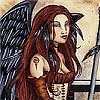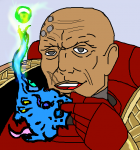Posted 14 February 2007 - 10:42 AM
That's a good way of putting it. I don't think the CG is the Christian God (aagh, same acronym) either, but there are quite a few shared themes - even if, as you say, they are inverted. They may not seem inverted to everyone - but, like I said before, if one looks at someone like Itkovian, who might be seen as having some similarities to Christ in that he took on the suffering of others to save them, one sees something a bit closer to a real mirror (although I really used that example initially because I find that how an author writes goodness is a far better indicator of his/her ability to engage morality in a deep and interesting way than the manner in which s/he writes evil; in a certain sense, it's easier to sink down to a lower level in one's mind than it is to rise higher - as C. S. Lewis put it (I think!) a man can sympathise with a horse, but a horse can't sympathise with a mouse (as least, as far as we know)).
However, when all is said and done, I try to avoid reading characters/events/places/items from fantasy books as allegories for things in our world. It does both the imaginary and the real world a great injustice - as well as muddying the waters surrounding the literary genre of allegory proper (in which the author writes a work in which each of the major components is intended to stand for something else - it can often be quite effective when done consciously, but sometimes the result is too heavy-handed). The best one can do, I think, is to identify common concerns, which may filter through the fantasy world in a different way than they do in our world, while having the same origin.
Aside from the general difficulty of making direct allegories where none were intended, I think that it's even harder to draw parallels in the Malazan world, because we often don't know who the "good guys" are - and this kind of obvious clarity is usually helpful when forming allegory (which, although it can be quite subtle, does tend to lose out on shades of grey as a whole). There sure are a lot of "bad guys" in the Malazan world, as well as many neutral parties, people doing their duty, and people just trying to survive. But, overall, apart from a few exceptions, it's not only hard to say who's good, but it's difficult to know who the author wants you to think of as good. (I spent ages feeling vaguely guilty that I didn't like Tattersail when she was "obviously" supposed to be a heroine - she was on the back cover of the first book, after all! - until I accepted that I was allowed to dislike her if I wanted. Recently, though, I've started wondering if we're even "meant" to like her.) How does this relate to the Crippled God? Well, he's one of the obvious baddies, I suppose, which makes him an easier subject of forced allegory. However, it must be added that even his character (spiteful, cruel and malicious as it is) leaves a certain openness to sympathy, in that he was dragged from his home cosm, and appears to be in near-constant pain. Thus, it seems better to treat him as an entity in his own right, rather than forcing the parallels that may exist in some ways to fit in all ways.

 Help
Help














